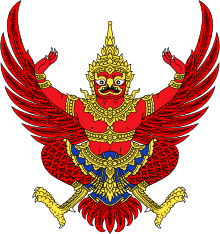Ministry of Labour (Thailand)
| กระทรวงแรงงาน | |
| Ministry overview | |
|---|---|
| Formed | 1993 |
| Jurisdiction | Government of Thailand |
| Headquarters | Din Daeng, Bangkok |
| Annual budget | 47,191 million baht (FY2017)[1] |
| Minister responsible |
|
| Website |
www |
The Ministry of Labour (Thai: กระทรวงแรงงาน, RTGS: krasuang raeng ngan; Abrv: MOL), is a Thai government body responsible for the oversight of labour administration and protection, skill development, and the promotion of employment in Thailand. The ministry was founded in 1993 as the "Ministry of Labour and Social Services", then renamed "Ministry of Labour" in 2002.[3]
Organisation
Article 35 of the Act on Reorganization of Ministries, Ministerial Bureaus and Departments, B.E.2545 (2002) established the following MOL structure:[4]
- Office of the Minister
- Office of the Permanent Secretary
- Department of Employment
- Department of Skill Development
- Department of Labour Protection and Welfare
- Office of Social Security
Somewhere in the mix of departments is the Office of Foreign Workers Administration.[5]
Jobs prohibited to foreigners
Prior to 1 July 2018, foreigners were not permitted to work in the following occupations.[6] The list is in the process of being rewritten as 12 professions previously limited to Thais will be opened to foreigners.[7]
- Labour work except work on fishing boats.
- Agriculture, animal husbandry, forestry or fishery, except work requiring specialized knowledge, farm supervision, or labour on fishing boats, particularly marine fishery.
- Bricklaying, carpentry, or other construction work.
- Wood carving.
- Driving motor vehicles or vehicles which do not use machinery or mechanical devices, except piloting aircraft internationally.
- Front shop sales and auction sale work.
- Supervising, auditing, or giving service in accountancy, except occasional internal auditing.
- Cutting or polishing precious or semi-precious stones.
- Haircutting, hairdressing, or beautification.
- Cloth weaving by hand.
- Mat weaving or making utensils from reed, rattan, jute, hay, or bamboo.
- Making rice paper by hand.
- Lacquer work.
- Making Thai musical instruments.
- Niello work.
- Goldsmith, silversmith, or gold/copper alloy smith work.
- Stone work.
- Making Thai dolls.
- Making mattresses or quilts.
- Making alms bowls.
- Making silk products by hand.
- Making Buddha images.
- Knife making.
- Making paper or cloth umbrellas.
- Making shoes.
- Making hats.
- Brokerage or agency except in international trading.
- Professional civil engineering concerning design and calculation, systemization, analysis, planning, testing, construction supervision, or consulting services, excluding work requiring specialized techniques.
- Professional architectural work concerning design, drawing/making, cost estimation, or consulting services.
- Dressmaking.
- Pottery.
- Cigarette rolling by hand.
- Tour guiding or conducting.
- Hawking of goods and Thai typesetting by hand.
- Unwinding and twisting silk by hand.
- Clerical or secretarial work.
- Legal services or engaging in legal work, except arbitration work. Work relating to defense of cases at arbitration level, provided the law governing the dispute under consideration by the arbitrators is not Thai law, or it is a case where there is no need to apply for the enforcement of such arbitration award in Thailand.
Foreign labor cap
On 1 July 2018 a new labor law will go into effect, capping the number of foreign employees at businesses operating in Thailand. The move was taken to ensure Thais are not forced out of the labor market. Passed by the National Legislative Assembly in April 2018, the new law will restrict the number of foreign employees to a maximum of 20 percent of workforce in the industrial and services sectors.[8] The law is opposed by business operators, especially those from small and medium-sized enterprises. (SMEs). The law will impact their hiring of low-cost migrant labor.[9]
References
- ↑ Thailand's Budget in Brief Fiscal Year 2017 (PDF). Bureau of the Budget. n.d. p. 78.
- ↑ "Profile of the Minister". Ministry of Labour. Retrieved 3 January 2018.
- ↑ "MOL History". Ministry of Labour (Thailand). Retrieved 22 August 2018.
- ↑ "MOL Duties". Ministry of Labour. Retrieved 27 July 2016.
- ↑ Chalamwong, Yongyuth; Chaladsook, Alongkorn (27 July 2016). "End Thailand's relaxed labour laws". Bangkok Post. Retrieved 27 July 2016.
- ↑ "OCCUPATIONS AND PROFESSIONS PROHIBITED FOR FOREIGN WORKERS; THE LIST APPENDED TO THE ROYAL DECREE IN B.E.2522 PRESCRIBING OCCUPATIONS AND PROFESSIONS PROHIBITED FOR FOREIGN WORKERS". Ministry of Labor. Retrieved 2018-06-03.
- ↑ "List of jobs reserved for Thais trimmed". The Nation. 22 June 2018. Retrieved 28 June 2018.
- ↑ Charoensuthipan, Penchan (7 May 2018). "Foreign labour cap set at 20% under new law". Bangkok Post. Retrieved 9 May 2018.
- ↑ Maikaew, Piyachart; Sritama, Suchat (8 May 2018). "Migrant labour cap piques businesses". Bangkok Post. Retrieved 9 May 2018.
